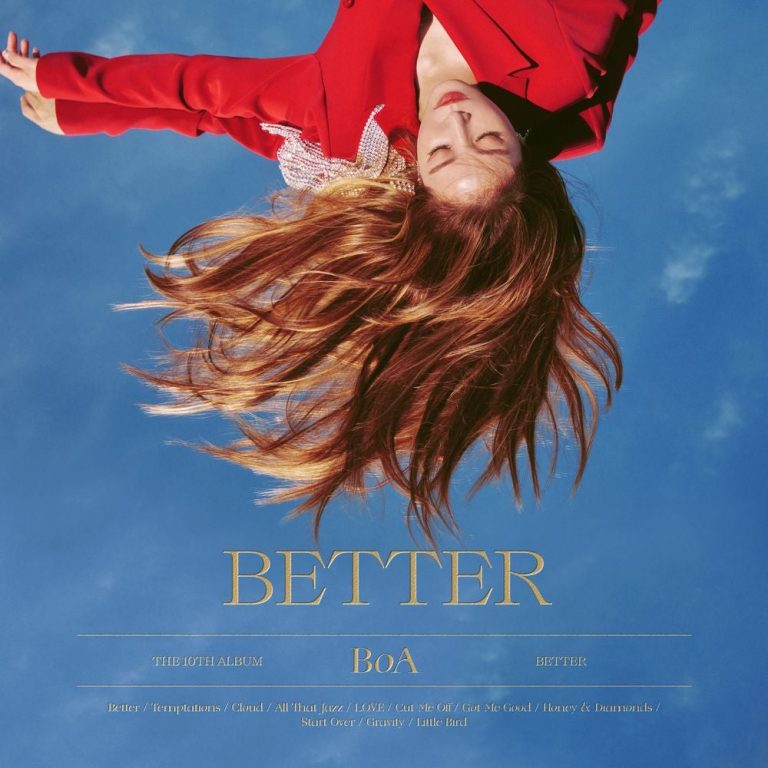A central flaw in the pop music landscape has always been its cruelty: how artists emerge into this heavily-populated field, release hits and become ubiquitously famous – only to suddenly fade. However, there has always been a special pantheon reserved for legacy artists who have made such a huge impact on their genre that their releases are always eagerly awaited. One such act is K-Pop singer-songwriter Kwon Bo-ah – known to the world as BoA – who has been active since 2000 under SM Entertainment. BoA has always been a consistent force, releasing an album or EP every year (including Japanese and English language efforts), accumulating millions of sales, acting in dramas, and even taking the role of coach on The Voice of Korea. Now, as we approach the end of 2020, the singer thankfully shows no signs of stopping as she releases her 10th studio album, Better.
As a new listener who has discovered her this year, Better is a very satisfying listening experience. While previous full-length album Woman occupies a similar world, Better fine-tunes the great aspects of it, becoming sleeker and more overt than its predecessor. Primarily encompassing the themes of sensuality, love and confidence, the album stays within the R&B wheelhouse with some detours into dance-pop and balladry. BoA explores different facets of her personality but the dominant one is the assertive and bold version of the singer who knows exactly what she wants. She delivers these songs with a playful glint in her eye – the glint of experience and maturity – and boldly shows herself as someone liberated and free.
The lead single “Better” is a sensual, 90s-influenced R&B jam that would feel at home on a Janet Jackson album – yet still possesses that timeless feel. BoA shows a laser-focused assertiveness as she sings to her love interest over an explosive chorus that he needs to do better and acknowledge the tension that’s between them. Her signature versatile vocals deliver the melodies effortlessly and reminds listeners that they are still as strong as ever. The song also connects back to the vibe of S.E.S’s iconic hit “Be Natural” (a girl-group who were also signed to SM Entertainment), which gives a modern yet nostalgic feel. Similarly, following track “Temptations” is another mature track with darker production that is slick and mysterious. Across twinkling plucked strings and bass synths, BoA is the bold seducer singing “So give into your temptations / Why you waiting?” This is more overtly sexual with her showing her grown woman side without any inhibitions. While “Cloud” switches things up with a more neo-soul approach and her vocal tone adopting a hint of a whisper as she sings about how, despite the fact that there could be flaws, it is always important to put effort into building love.
The crown jewel in this album is the retro, 80s-influenced bop “Honey & Diamonds”, which is BoA’s fun proclamation of confidence. It occupies a space between colourful pop and smooth R&B to create a feel-good masterpiece. Across bright synths, electric guitar and a classic drum beat, her vocals resonate with the euphoric chorus and shows her in full bloom. Lyrically, she sings about maintaining her positive energy and keeping her heart open as a way to shine. Even though this song speaks about love with someone else, this also feels like an affirmation that finding your self-worth is just as important.
However she doesn’t just play the role of the woman in touch with her desire, but also shows her vulnerability on a lot of the tracks. With fast piano and finger-clicks, “All That Jazz” has her exhausted from a break-up, unable to find solace in her favourite things and questions how you can be scarred in such a short moment. “Cut Me Off” – despite its more subdued mid-tempo production – is BoA at her most savage as she almost apathetically sings: “I’m sick and tired of your love / So cut me off.” A warning of how co-dependence in a relationship can be toxic.
The ballad “Gravity”, despite some trite lyrical content about being at someone’s side like gravity, has shifting production with echoing drums, piano, lush harmonies and strings. The sweeping song progresses colourfully, showcasing how wonderful and gentle BoA’s vocals are alongside their power. A particular highlight is the bridge, where the song is stripped back before harps and rumbling drums come in; it’s these flourishes that elevate the song above being a conventional ballad.
Better‘s concluding track “Little Bird” is a pop-rock ballad, which ends the album on a poignant yet uplifting note. BoA acknowledges that despite her massive successes, she still has demons – which is understandable considering her two decades in the public eye – but has hope she can conquer them and find freedom.
Ultimately, BoA’s Better is an album that will captivate new listeners unfamiliar with her work and satisfy those who have followed her illustrious, lengthy career. Her agile voice combined with the classic yet modernised production ticks a lot of boxes, whether you want to dance or reflect on things. While it mostly stays loyal to cohesion, there are still a few uneven surfaces in this album that could be rectified by some rearrangement of the tracklist. What’s most important however is that BoA is one of those rare artists who can release high-calibre projects so long into her career. This album sends the message that we, as listeners of pop music, should always make sure we stay in touch with the icons of our time – at the risk of missing out on something amazing like this album.

